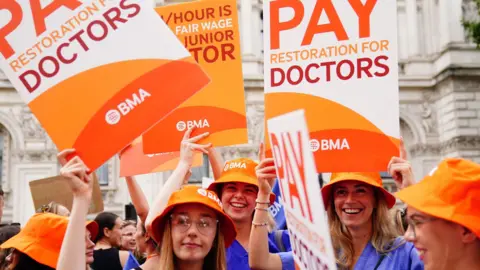In recent developments within the healthcare sector, doctors in England are expressing significant dissatisfaction over a proposed pay increase of 4%, which has sparked discussions about potential strike action. The British Medical Association (BMA), the prominent union advocating for doctors, has labeled the offer as “derisory,” highlighting that it falls substantially short of addressing years of stagnant wages and inflationary pressures. This 4% increase, set to take effect on April 1, is deemed insufficient when contrasted with the historical wage freezes that medical professionals have endured.
The issue of public sector pay has become a hot-button topic, particularly in the face of rising costs of living and inflation rates that continue to challenge financial stability. In a related realm, the National Education Union (NEU) has also indicated its willingness to register a dispute with the government unless adequate funding is assured for teachers in England, who have also been offered the same 4% pay increase.
Health Secretary Wes Streeting has defended the government’s offer, claiming it surpasses inflation. However, the feedback from medical professionals suggests widespread dissent regarding whether this increase genuinely reflects the value and contributions of doctors to the healthcare system. BMA council chairman, Professor Philip Banfield, has articulated the concern that, when adjusted for inflation, doctors’ earnings are approximately a quarter less than they were fifteen years ago. This stark reality prompts him to assert that the proposed pay rise does not mark progress but rather takes the profession a step backward.
Dr. Banfield has expressed a sentiment that no healthcare professional wishes to engage in picket lines or strike action, yet he acknowledges that the current state of affairs is increasingly pushing that outcome towards likelihood. In response to this discontent, the BMA has announced plans to ballot its members next week, considering the possibility of strike action, amplifying the urgency of negotiations regarding fair compensation.
In conjunction with the medical community’s apprehensions, the reaction from health unions like the Royal College of Nursing has been fervent, particularly regarding their members’ pay. Nurses and other frontline workers were offered a lesser increase of 3.6%, which the Royal College of Nursing has denounced as “grotesque.” They argue that this lesser amount would quickly be negated by ongoing price rises, further stoking tensions within the healthcare workforce. Additionally, the nursing union is preparing to consult its membership about their views on the pay rise and whether to pursue industrial action, which could lead to a formal vote on strike options.
Looking beyond England, the pay disputes highlight broader systemic issues in the UK’s healthcare remuneration framework. The Department of Health has announced an added £750 for resident doctors, which brings average pay rises to 5.4%. Nonetheless, many in the healthcare sector feel this is insufficient to meet the demands of a workforce that has engaged in multiple strikes, advocating for substantial wage corrections following many years of inadequacies.
In Wales and Northern Ireland, health workers should expect similar pay increases, as their respective governments align with the proposed adjustments. In Scotland, the situation for NHS staff appears to be slightly better, with a reported acceptance of a 4.25% increase for 2025-26.
As negotiations continue, Secretary of State for Health and Social Care, Wes Streeting, has emphasized the government’s commitment to improving pay and recognition for NHS workers, while underlining the challenges posed by a “decade and a half of neglect.” This sentiment reflects an ongoing struggle to balance economic pressures with the necessity for adequate public sector compensation in a post-pandemic landscape where healthcare professionals have been immensely strained.
Thus, with escalating sentiments regarding pay disparities within the healthcare sector, the threat of renewed strike action looms large, posing significant implications not only for NHS operations but also for the political landscape as government entities grapple with the consequences of unmet workforce demands and public sector funding challenges.



